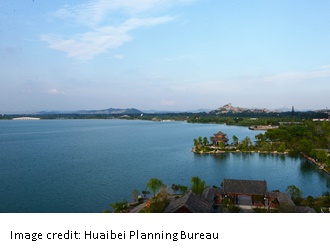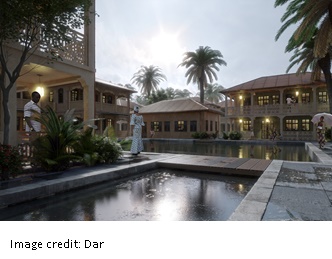President’s foreword
(Dr Wei Yang FRTPI was RTPI President in 2021)

The launch of the new RTPI International Strategy 2021 - 2030 is another step forward in delivering RTPI’s ambitious goals over the rest of this decade as a leading global professional body to promote healthy, socially inclusive, economically and environmentally sustainable places.
In 2020, the United Nations declared the beginning of a Decade of Action and the RTPI published its new Corporate Strategy 2020-2030. This alignment demonstrates our determination that town planners must ‘take the lead’ on achieving the UN Sustainable Development Goals and advance the New Urban Agenda in the built environment.
In this crucial moment of our planet’s history, we need to think globally and act locally and seek innovative and sustainable solutions to tackle the world’s biggest challenges — global poverty and rising inequality, the climate emergency and biodiversity crisis, the global displacement crisis, widespread environmental degradation and global health threats.
I am proud that the RTPI International Strategy is centred on a vision for planning as a positive force for global sustainable development and is focussed on a mission to empower our members to lead the Institute’s action internationally.
Despite the impact of COVID-19, preparing the strategy has been an inclusive exercise. During 2020, an International Strategy Working Group worked across RTPI standing committees, panels, RTPI Nations and Regions in developing the strategy.
I would like to thank the members of that working group, the RTPI International Committee, and everyone who contributed; particularly the RTPI International Policy and Research Officer, Dr Michele Vianello, and the Chair of the International Committee, Janet Askew MRTPI.
I hope that the International Strategy will facilitate collaborative actions across the institute’s membership and inspire our engagement with stakeholders worldwide.
I look forward to seeing transformative changes on how we plan the world we need.
Dr Wei Yang FRTPI, RTPI President 2021
Contents
Executive summary
1. Background
4.1 Pillar one - Promote the value of membership internationally
4.2 Pillar two – Promote planning knowledge and practice
4.3 Pillar three - Raise the profile of planning for global challenges
4.4 Pillar 4 - Diversity and inclusivity through internationalisation
5. Opportunity: internationally focussed groups
Executive summary
The RTPI International Strategy 2021 - 2030 promotes the value of planning internationally as a lever for advancing a prosperous, fair, sustainable and peaceful world, in alignment with the mission of the United Nations and the main international agreements on climate change and sustainable development.
It supports the RTPI in leading globally as a professional body shaping a positive future for the common good by coordinating the Institute’s engagement with global challenges.
Independence from external influence, transparency, openness and strong professional standards are the foundations of the Institute’s good reputation. These principles will underpin our efforts to establish planning as a key part of the solutions to global challenges, in pursuit of long-term, sustainable, inclusive and fair outcomes for all.
The RTPI International Strategy is centred on:
- a VISION for planning as a positive force for global sustainable development;
- a MISSION to empower members to lead our action internationally.
Based on the Corporate Strategy’s four pillars, the International Strategy identifies four key aims:
- Promote the value of RTPI membership internationally.
- Support planning knowledge globally.
- Raise the profile of planning for global challenges.
- Diversity and inclusivity through internationalisation.
One high level objective specifies the expected outcomes in each of these areas, guiding the Institute’s action across the delivery of our services so that RTPI members are empowered to support global sustainable development and climate action wherever they are.
Establishing internationally focussed groups which are part of global planning communities across different countries will underpin the Institute’s internationalisation and offer a key opportunity for involving members based outside of the UK and Ireland.
The International Strategy has the ambition to support members and society at large in using planning as an instrument to make the bold and necessary moves needed to put the world on a path of sustainable, equitable and inclusive development. It will be delivered through the projects detailed in the RTPI Corporate Strategy Implementation Plan and in alignment with other relevant RTPI strategies.
1. Background
The world is confronted with climate change, rapid urbanisation, high rates of poverty and inequality, unsustainable patterns of production and consumption, global health threats, displacement and many more challenges. The COVID-19 pandemic has brought to the fore the rapid and profound impact that these challenges can have when they are compounded by a global crisis. It also has made visible new opportunities for rethinking development paths everywhere and fostering the achievement of the UN Sustainable Development Goals by promoting ideas exchange and new practices through an enhanced use of digital technology. As the RTPI campaign Plan the World We Need outlines for the UK, planning will have a key role in implementing and delivering the SDGs, taking an holistic and integrated approach to prosperity, within the ability of our planet to regenerate the excess of resources we have consumed over the past decades, and with the promotion of collective well-being and the fulfilment of the human potential at its heart.
In order to align efforts with global planners and support economically, socially and environmentally sustainable development, the RTPI engagement with global challenges will focus on advancing the shared objectives of the UN Sustainable Development Goals and the UN Framework Convention on Climate Change. The RTPI Corporate Strategy has climate action as its main framework for delivery and internationalisation as one of its ten foundations.
This strategy details how the Institute will engage members with these key and urgent issues.
2. Introduction
 The RTPI aims to be a valued and trusted partner internationally, working with global and national organisations and planning associations through international co-operation and multilateralism to strengthen planning skills and advocate for planning as a key instrument to addressing global challenges. The RTPI’s commitment will build on the leading role it has played globally as a founding member of the Commonwealth Association of Planners, the European Council of Spatial Planners – Conseil Européen des Urbanistes and the Global Planners’ Network.
The RTPI aims to be a valued and trusted partner internationally, working with global and national organisations and planning associations through international co-operation and multilateralism to strengthen planning skills and advocate for planning as a key instrument to addressing global challenges. The RTPI’s commitment will build on the leading role it has played globally as a founding member of the Commonwealth Association of Planners, the European Council of Spatial Planners – Conseil Européen des Urbanistes and the Global Planners’ Network.
The RTPI Corporate Strategy 2020-2030 has identified four ‘pillars’: Value of Membership, Support to Planning Services, Raising the Profile of Planning and Equality and Diversity. The Corporate Strategy also recognises that the world needs more professionally qualified planners in order to address global population growth, rapid urbanisation and climate change.
The International Strategy specifies the four Corporate Strategy ‘pillars’ in their international implications, and adopts them as its priority areas for action. This will provide an integrated framework for the RTPI to establish planning as key to achieving global sustainability, and planners as having a pivotal role in fostering it.
3. Vision and mission
The International Strategy is centred on members’ leadership and its aims are detailed in a vision and a mission. By committing the RTPI to taking action on global issues, these reinforce and broaden the Institute’s original mission as a charity and learned society to serve the public interest through planning.
3.1 Vision
3.2 Mission
The RTPI promotes excellence in planning globally, empowers members to influence global policy, and supports society to achieve a democratically accountable and inclusive planning practice fit for the information age everywhere.
4. Key aims and objectives
Internationalisation will be delivered through co-ordinated action across the existing RTPI services and by expanding the RTPI offer with new ones.
Meeting global challenges relies on collaboration. The RTPI International Strategy will be delivered through co-operation and global partnerships, by enhancing ideas exchange, the accessibility to planning skills and knowledge, via collaborative and inclusive research, as well as dedicated campaigning and inclusive advocacy efforts.
These strands of work have been grouped into the following four pillars, with a high-level objective specifying the aims to be achieved in each of them.
- Pillar one - Promote the value of membership internationally.
Objective one - Enhance the value of RTPI membership internationally, including developing partnerships with relevant local actors internationally (professional associations of planning, planning schools, public sector, private sector, national and local governments, planning bodies, third sector etc.) and global actors (networks of city diplomacy, third sector, international development agencies etc.). - Pillar two - Support planning knowledge and practice internationally.
Objective one - Enhance the global presence of the RTPI as an organisation promoting excellence in global planning knowledge, CPD, professional skills and practice, and supporting other organisations’ efforts in this area. - Pillar three - Raise the profile of planning for global challenges.
Objective three - Increase the international reach and the influence of RTPI research, through the engagement with relevant governmental, non-governmental and multilateral organisations, including via tailored and collaborative communications campaigns. - Pillar four - Diversity and inclusivity through internationalisation.
Objective four - Ensure that the internationalisation of the RTPI increases the diversity and inclusivity of our membership so that our action is shaped by a diversity of voices, ideas and approaches with policy and practice reflecting the aspirations of the communities planning serves.
4.1 Pillar one - Promote the value of membership internationally
 Planners around the world are dynamic, responding to new challenges, developing and adapting to new theories and methodologies. Communities that can benefit most from good planning have urgent and pressing needs, particularly where access to planning skills and services can be constrained or is unavailable.
Planners around the world are dynamic, responding to new challenges, developing and adapting to new theories and methodologies. Communities that can benefit most from good planning have urgent and pressing needs, particularly where access to planning skills and services can be constrained or is unavailable.
Internationally, the value of RTPI membership rests on the ability of the Institute to make planners heard in national and global arenas as an authoritative voice speaking in the public interest thanks to the RTPI principles of openness, transparency, independence and strong professional standards. These specific characteristics represent the core values of RTPI membership and can enhance planners’ relevance everywhere.
The RTPI International Strategy promotes them as an avenue to not only attract new members, but to support and retain existing ones. It also aims at enhancing planning knowledge through mutual learning and to make better planning available where it is most needed by supporting members in being heard and in sharing their expertise with others through equal partnerships.
Besides these core values, RTPI membership will also provide tangible benefits and services internationally, including mutual recognition agreements, guidance and support through publications, all of which offer opportunities for members based in the UK and Ireland to learn from relevant planning policy and practice overseas through the exchange of knowledge, regardless of where they are based, fostering South-South co-operation as well as learning across the Global South and North.
The value of RTPI membership will be shaped in a dialogue with the multilateral organisations with which the Institute engages, the other built environment professions, the RTPI accredited planning schools and the global planning organisations of which we are members, and across the private and public sector. This will ensure that planning is tailored to the needs of different contexts and communities and focusses on advancing the public interest everywhere.
This will be achieved by:
- supporting an understanding of what drives value for members internationally and where the promotion of the value of RTPI membership can have the strongest impact;
- assessing which classes of membership would have an impact on global planning policy and practice, and appeal to potential RTPI members globally, with a focus on the role of the Associate, Affiliate and Fellow classes of membership besides that of Chartered Planner, in making planning more inclusive;
- identifying planning courses in currently accredited schools that have a global focus for review and assessment through existing RTPI partnership boards and within existing capacity which could offer the opportunity and potential for increasing international membership;
- ensuring that a global perspective is considered when the plans to promote and communicate the value of membership are adopted by the Institute;
- offering relevant and tailored member services which are suited to members based or working internationally, including the means and opportunities to influence policy, share knowledge and learn from best practice.
Outcomes:
- Planning and planners are recognised at the highest level as well as in local contexts internationally as key to fair and inclusive solutions to global challenges.
- The RTPI is a trusted partner and is consulted by key national and international stakeholders working on global development and climate change.
- Members working and based internationally are actively engaging with the institute, feel valued and see the RTPI as a platform to have their voice heard and influence global and national processes.
- Members working and based internationally are connected to each other and are seen as influential and authoritative by the communities they serve and the stakeholders they work with.
- Members working or based internationally grow together with their level of engagement with the Institute and are incentivised and enabled to share knowledge with each other.
- Employers and organisations working in global development and urbanisation recognise and require RTPI or other local professional planning qualifications to ensure high professional standards.
4.2 Pillar two – Promote planning knowledge and practice
Planning knowledge should be context-relevant, up-to-date and focussed on advancing fair, sustainable and inclusive outcomes globally through equal partnerships and mutual learning. The RTPI International Strategy identifies, as a priority objective, supporting the production and dissemination of critical, original and sound planning knowledge to inform global practice and policy internationally. Planning is recognised as a pivotal issue in global policy and as an avenue to address global challenges, starting with the recovery from the COVID-19 pandemic.
This objective will be supported by establishing strong links with global higher education institutions, other planning organisations and research institutions that have rapid urbanisation and global development in their remit, and by engaging with civil society and governmental organisations. This entails both engaging with, and exploring accreditation of, new overseas planning schools - where this supports the wider objectives of this strategy - and renewing our dialogue with existing RTPI accredited planning schools so that the Institute can be a key partner for them to promote, shape, share and ensure impact for their research via the Institute’s membership in global platforms and organisations.
Better evidence is needed to demonstrate the key role of planning in addressing climate change, rapid urbanisation and global development. The Institute will use its internationally renowned journal Planning Theory and Practice as an avenue to help shape the debate on the role of planning in addressing these challenges. The RTPI Research Programme will include commissioning original and impact-orientated research exploring both traditional and emerging global planning issues, while our UK and Ireland focussed research and RTPI Awards for Planning Excellence will contribute to advancing international agreements by sharing and promoting UK and international best practice.
The RTPI will ensure that members have the tools to understand the global implications of their work for climate change and global sustainable development.
The RTPI will continue to work to serve the needs of all its members, including those based or working internationally, with access to professional and practical training and CPD activities appropriate for their continuous professional development needs and support them in finding planning-led solutions to global challenges.
Through partnerships and collaborations, we will conduct, facilitate and support initiatives that develop planning skills and evidence and make them available to local stakeholders, particularly where planning capacity is limited.
This will be achieved by:
- positioning the Institute as a provider and partner for research into planning issues for global development;
- including in the new RTPI research programme a specific international component, and ensuring that research with a UK and Ireland focus addresses global issues, and that learning from international contexts informs planning policy and practice in the UK and Ireland;
- forging partnerships with HE institutions, research institutions and international civil society and non-governmental organisations to commission, co-produce and promote planning knowledge for global challenges;
- ensuring members working or based internationally have access to context-relevant planning knowledge and CPD opportunities provided by the Institute or in partnership with others;
- linking RTPI accredited planning schools to internationally focussed groups and the global planning communities with which the RTPI has links;
- offering RTPI accredited planning schools opportunities to influence global policy through the RTPI participation in global conferences and summits and via our engagement with global stakeholders;
- engaging with research providers and institutions internationally, including RTPI accredited planning schools, to fund and co-produce original and innovative pieces of research.
Outcomes:
- The RTPI Learn online platform and RTPI Training programme are key references for members working or based internationally and other stakeholders.
- Existing and potential new RTPI accredited planning schools see the Institute as a key partner in the production and dissemination of planning knowledge.
- All internationally focussed groups have strong links with academia and key research institutions.
- RTPI accredited planning schools with a global development focus have a direct link with RTPI internationally focussed groups which support them in achieving impact for their research.
- The RTPI informs its campaigning and research objectives in a close dialogue with key stakeholders with reporting mechanisms to the International Committee.
- Key regional and international multilateral organisation refer to planning and the RTPI itself and use planning evidence as part of their strategies to address global challenges.
- Evidence produced by the RTPI and our partners is used to scrutinise government action and inform policy.
- The RTPI supports or delivers capacity building for planning overseas in places that are critically lacking planning capacity.
- Employers globally recognise the membership of the RTPI as a guarantee of professional competence and ethics and see it as an avenue to guarantee and develop the skills of their workforce, particularly for global challenges.
4.3 Pillar three - Raise the profile of planning for global challenges
 Global planners’ voices need to be heard for planning to advance the public interest and influence global processes. The RTPI International Strategy identifies, as a priority objective, establishing planning as a key avenue to achieving global sustainable development by structuring a coherent, evidence-based narrative that global stakeholders can refer to and adopt in order to call for sound, democratically participated and accountable planning policy and practice everywhere.
Global planners’ voices need to be heard for planning to advance the public interest and influence global processes. The RTPI International Strategy identifies, as a priority objective, establishing planning as a key avenue to achieving global sustainable development by structuring a coherent, evidence-based narrative that global stakeholders can refer to and adopt in order to call for sound, democratically participated and accountable planning policy and practice everywhere.
The status of the RTPI as a learned society and as the body setting and upholding professional and educational standards in the UK and Ireland underpins our authoritativeness and reputation. High-level advocacy will be the main vehicle to raise the profile of the profession across the public, private and third sectors at all levels, from local and national governments to multilateral organisations. The RTPI will build on its partnership with multilateral organisations, such as UN-Habitat, and with diplomacy efforts, such as the adoption of SDG11 as part of the UN Resolution 70/1 “Agenda 2030”, to strengthen its position as a global advocate of planning-led solutions to global challenges.
This will draw on the excellence in planning practice built by the RTPI in serving the public interest in the UK during its long history since 1914, as well as on the expertise of members based and working overseas.
This will be supported by dedicated marketing and campaigning efforts across our social media channels and publications, and in our engagement with British parliamentary affairs through new ad-hoc campaigns that promote planning for global sustainable development and global climate action.
The current global campaign for better planning services everywhere held every 8th November on World Town Planning Day will be enhanced. This will include giving international resonance to the RTPI efforts to promote the value of the profession to children and young people in alignment with our annual World Town Planning Day schools competition and engagement with accredited planning schools across the world.
This will be achieved by:
- supporting and delivering advocacy and communications campaigns directed to key stakeholders that promote planning as a part of the solution to global challenges;
- engaging with the appropriate Government departments in the UK and Ireland responsible for foreign and aid policy;
- playing an active role in promoting excellence in planning through international platforms, such as the UN-Habitat convened platforms Planners for Climate Action or the World Urban Campaign;
- strengthening our relations with international planning organisations to support mutual efforts and advocacy;
- approaching key international platforms where the RTPI can provide insights and support in addressing emerging global challenges;
- continuing to lead and increasing the influence of the World Town Planning Day campaign;
- conducting new impactful advocacy campaigns based on original evidence.
Outcomes:
- Key global stakeholders engage with the World Town Planning Day campaign with the RTPI playing a key role in designing its messaging and coordinating it.
- The RTPI is consulted and advises government and international organisations on the design and delivery of programmes addressing global challenges through planning.
- The RTPI, in alignment and coordination with others, delivers new focussed campaigns promoting planning’s role in effective climate action and delivering sustainable development.
4.4 Pillar 4 - Diversity and Inclusivity through Internationalisation
 Planners around the world are increasingly engaging and co-producing plans and strategies with diverse stakeholders and using local knowledge to address climate change and foster inclusive development. For planning to achieve fair outcomes that leave no one behind, it is key that the planning profession is inclusive and representative of the communities it caters for, that planning knowledge is fit to respond to their needs and used to enhance representation and equality.
Planners around the world are increasingly engaging and co-producing plans and strategies with diverse stakeholders and using local knowledge to address climate change and foster inclusive development. For planning to achieve fair outcomes that leave no one behind, it is key that the planning profession is inclusive and representative of the communities it caters for, that planning knowledge is fit to respond to their needs and used to enhance representation and equality.
The RTPI International Strategy recognises increasing the diversity of our membership through internationalisation as an opportunity in the implementation of the RTPI Equality, Diversity and Inclusivity Action Plan (EDI).
The EDI Action Plan core areas of Education, Leadership and Culture, and Attract and Retain a Diverse Talent will encourage a diverse planning knowledge, education and membership, which will help to shape the future of the profession in the UK and Ireland and globally.
The promotion of diversity, equality and inclusivity will inform how planning knowledge is produced and disseminated, increasing the legitimacy and relevance of the ideas that inform planning everywhere.
The RTPI will engage a diversity of voices in shaping planning knowledge and practice, irrespective of social, cultural or other background, so that these reflect the diversity of the communities planning is meant to serve. This will strengthen planning’s legitimacy in advocating for the changes needed to put the world on a path of sustainability.
This will be achieved by:
- ensuring that the delivery of the EDI Action Plan takes into full consideration the internationalisation of the RTPI as a key opportunity to increase the equality, diversity and inclusivity of our membership and of planning knowledge and practice;
- engaging global members in the implementation strategies and programmes of the EDI Action Plan in the relevant core areas.
Outcomes:
- A diverse global membership actively contributes and engages with the RTPI in implementing the transformative change needed in the profession and informing its position on global development and climate action.
- Members working or based internationally are diverse, represent the communities they serve and are fairly represented at all levels in the governance and representation system of the Institute.
- RTPI global development and climate change advocacy is informed by the knowledge and expertise of our global members.
- The planning profession is diverse and inclusive and planning practice and policy is reflective of this and draws upon a diversity of expertise and planning ideas fostering mutual learning and collaboration globally – with South-South exchanges and across the Global South and North.
5. Opportunity: internationally focussed groups
The engagement of planners with global challenges needs to be localised. In order to deliver this strategy, the RTPI will facilitate the formation of internationally focussed groups - led, convened or supported by RTPI members - acting as platforms for knowledge exchange, mutual learning and promotion of sound and context-relevant planning policy and practice.
The RTPI internationally focussed groups will be the key avenue for engaging members with planning-led solutions to rapid urbanisation, climate change and global sustainable development, with local contexts and communities in mind. These groups will provide a conduit for strengthening the Institute’s links with global planning communities.
This will include an active and coordinated engagement of RTPI members living and working in the UK and Ireland, with a view to enhancing the exchange of ideas and fostering innovation in the practice of planning both internationally and domestically.
Such groups will also provide a conduit to support international students graduating from RTPI-accredited courses and prospective members to engage with RTPI chartered members and be supported in their journey towards membership.
The RTPI-convened internationally focussed groups will be of three kinds:
- Internationally focussed groups based in the UK Nations and Regions and Ireland;
- A Planning for Global Sustainable Development Network focussing on global policy;
- Local RTPI networks facilitated, convened or supported by members, based in specific world regions or countries.
This will be achieved by:
- supporting the formation of internationally focussed groups with dedicated terms of reference;
- linking internationally focussed groups to a local community of stakeholders through schools, employers, governmental institutions, NGOs, etc.;
- delivering the internationally focussed groups’ activities through the expertise and interest of RTPI members, using decision and engagement structures that are inclusive, transparent and reflective of local priorities;
- supporting the formulation of the internationally focussed groups’ work programmes that are engaging, with events and networking opportunities that facilitate the production and dissemination of context-relevant planning knowledge;
- supporting the internationally focussed groups’ activities with RTPI campaigns for positive planning outcomes internationally.
Outcomes:
- By 2030, internationally focussed groups will be formed in all of the nations and regions of the RTPI, and be active overseas.
- An RTPI Planning for Global Sustainable Development Network will engage with global policy through consultation responses and providing evidence to external stakeholders on behalf of the Institute.
- Internationally focussed groups are inclusive, context-sensitive and respected groups that positively engage with global and local policy and practice and support the production and dissemination of planning-led solutions to global challenges.
6. Implementation and review
An implementation plan will be developed to sit alongside this strategy. The implementation plan will align with the Corporate Strategy Implementation Plan and link to the RTPI service plans and budget cycles to ensure the deliverables are being factored into the relevant service plans.
The implementation plan will include who will lead and own each of the deliverables.
The investment required to deliver the strategy will be sourced as part of the Corporate Strategy Implementation Plan designated funding.
The world is experiencing an extraordinary crisis with the COVID-19 pandemic, and this will impact on the order of the priorities in the implementation plan, resulting in a need to be flexible to react and respond to a changing situation.
The strategy will be monitored on an annual basis and reviewed every three years in line with the RTPI service plans and budget cycles. This will give an opportunity to review the measures of success, or add to them as deliverables start to make their impact evident.
The International Strategy has been adopted by the International Committee of the RTPI. It was composed during 2020 by the RTPI International Strategy Working Group:
Chair: Janet Askew MRTPI
Main author: Michele Vianello Ph. D., RTPI International Policy and Research Officer
Members: Nadeem Ahmed MRTPI, Helen Fadipe MRTPI, Steve Kemp MRTPI, Jayanand Kumaraguru MRTPI, Kirsty Macari MRTPI, Christine Naylor MRTPI, Deb Upadhyaya MRTPI and Wei Yang FRTPI
